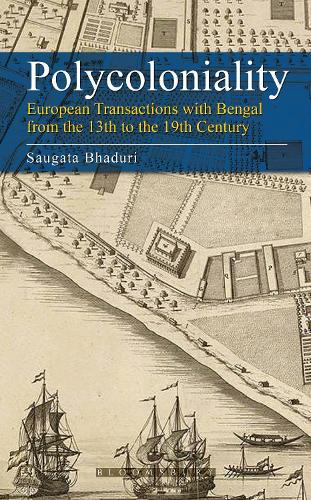
Polycoloniality: European Transactions with Bengal from the 13th to the 19th Century
(Hardback)
Publishing Details
Polycoloniality: European Transactions with Bengal from the 13th to the 19th Century
By (Author) Saugata Bhaduri
Bloomsbury India
Bloomsbury Academic India
31st July 2020
India
Classifications
Tertiary Education
Non Fiction
Literary studies: postcolonial literature
Literary theory
Physical Properties
Hardback
254
Width 140mm, Height 218mm, Spine 20mm
420g
Description
Polycoloniality is a study of the activities of non-British European powers and players primarily the Portuguese, the Dutch, the French, the Danish, the Germans (representatives of the Austrian and Prussian empires), the Swedish and the Greek in Bengal from the late 13th to the early 19th century, and their role in shaping Bengal's brush with 'colonial modernity' prior to, and possibly more foundationally than, the English. Much of the traditional historiography of colonialism, in South Asia in general and Bengal in particular, and the resultant postcolonial commonsense, is woefully mononational, with the focus being almost exclusively on England and its colonial exploits. This is obviously factually incorrect and inadequate, with the multiple European nations named above having had simultaneous colonial contact with Bengal from the 16th century, and there having been a steady flow of Europeans, primarily Italians, to Bengal from at least the late 13th century. More importantly, it is these multiple European players, rather than the English, who can be credited with the setting up of the first cosmopolitan cities in Bengal, its first colleges and universities, the beginnings of print culture in Bengali, the foundations of the modern linguistic, literary and cultural registers of Bengal, the first instances of social and political reforms, etc. Apart from an elaboration of all the above, can Polycoloniality, or a re-look at Bengals colonial history through the lens of plurality, also offer a template to understand the multinational forms of current new-imperialism more fittingly than postcolonial commonsense can
Author Bio
Saugata Bhaduri is Professor at the Centre for English Studies, Jawaharlal Nehru University, New Delhi, India. His areas of research interest are contemporary literary and cultural theory, popular culture studies, the theory and practice of translation, and comparative literature, in all of which he has taught, published and conducted research extensively.
